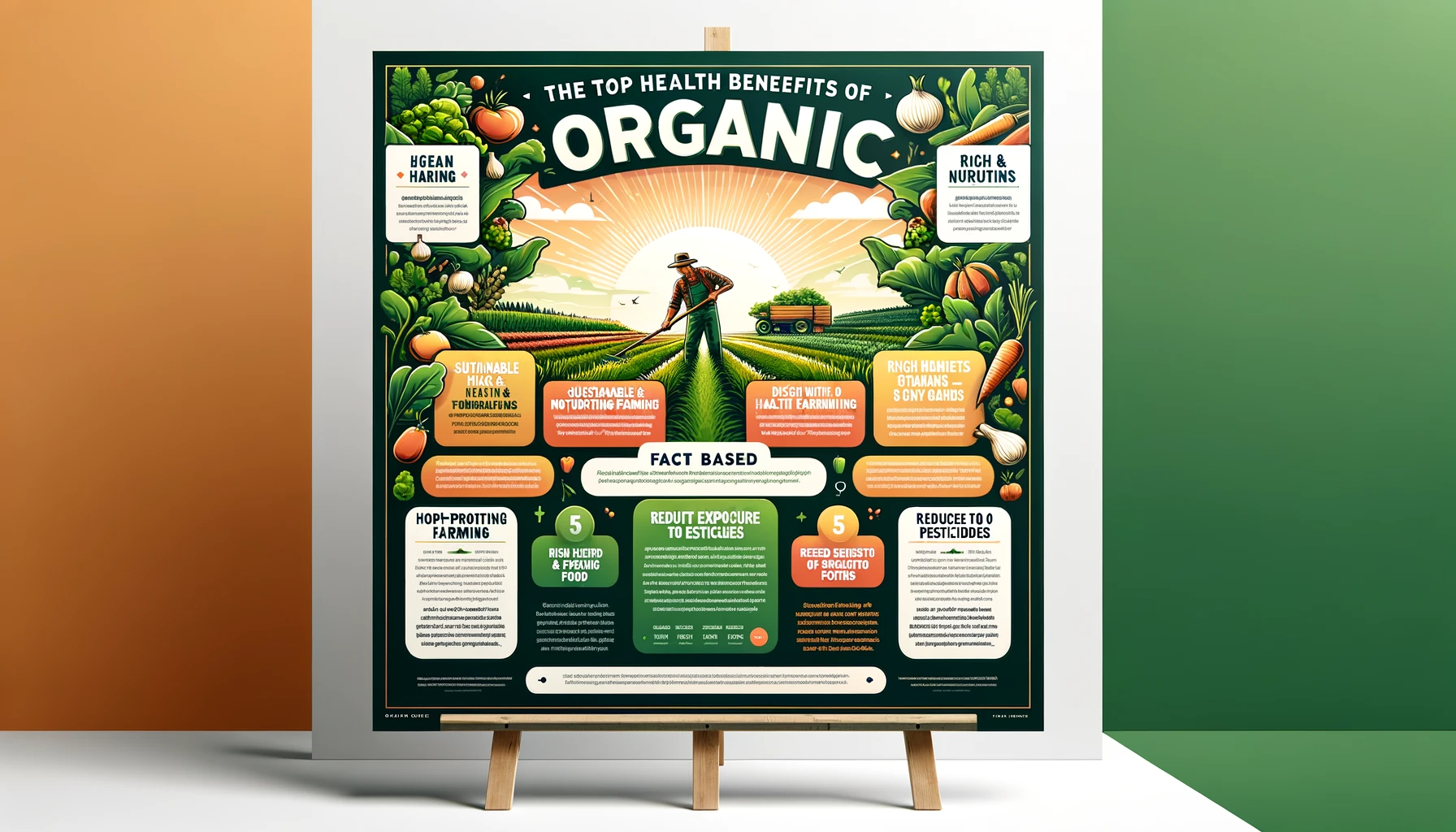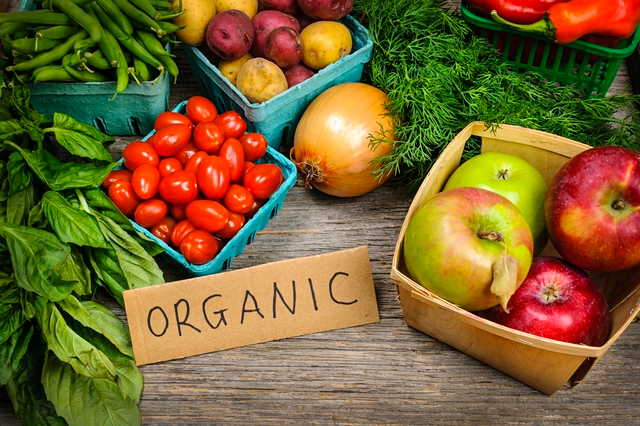The Top Health Benefits of Organic Food - Fact Based
Posted by Kylie Shaw on 20th Nov 2023
Embrace the remarkable health advantages of organic food and cultivate a healthier lifestyle that benefits you and the environment. Discover ten incredible reasons to embrace an organic diet! Whether you're seeking enhanced flavour, sustainability, or improved well-being, one thing is sure: transitioning to an organic lifestyle for the betterment of our planet is a choice that deserves recognition and encouragement. Enter the world of organic food today!

Key Takeaways
- Organic food production is a sustainable, health-promoting method of farming that offers increased nutrient density without harmful and toxic pesticides.
- Organic foods are nutritionally beneficial due to their higher levels of essential vitamins, minerals, and heart-healthy omega-3 fatty acids.
- Individuals with allergies or sensitivities may experience reduced symptoms when consuming organic
- Careful reading of labels and prioritising organic purchases have many benefits.
Understanding Organic Food

Organic food production cultivates crops without synthetic chemicals or genetically modified organisms (GMOs). Opting for organically grown products offers a range of benefits, including enhanced nutrient levels, reduced exposure to heavy metals and pesticides in our diets, and the presence of omega-3 fatty acids from organically raised livestock. Farmers seeking to label their products 'organic' must adhere to strict national regulations. While organic produce may be slightly pricier due to certification costs and the labour-intensive nature of organic farming methods, an environmentally friendly lifestyle promoting a cycle of self-sustaining resources is well worth it.
Organic Farming Practices
Organic farming promotes the well-being of people, society, and the environment by operating with ecological systems and cycles while striving for fairness. Instead of synthetic pesticides or fertilisers, there are a few natural means to protect crops, such as crop rotation techniques and chemicals, which involve different methods like companion planting and biological control management. It provides organic food free from chemical residues without needing too much input, plus nutritionally favourable produce created on certified organic farms expressly set up for this purpose.
Demeter Certifications:
The Demeter certifications are highly recognised and promote the quality assurance of organic food. The certification ensures that organic farmers use sustainable farming practices that conserve the environment, protect natural resources, and support animal welfare while improving farm productivity. The certified farms also adhere to the standards set by national regulations regarding food safety and organic production processes.
We also like Demeter certification, which we believe is a superior standard to being certified organic. It is an internationally recognised mark for biodynamic agriculture. Demeter International, an organisation of biodynamic farmers and processors in more than 50 countries, presents it. Demeter biodynamic farming aims to cultivate food in a way that harmonises with the natural world.
Demeter Certification's key attributes are:
- A holistic approach to agriculture: Demeter certification focuses on the overall health of the farm ecosystem, from the soil to the plants and animals. This includes using natural methods to control pests and diseases and promoting biodiversity on the farm.
- Use of biodynamic preparations: Biodynamic preparations are specially formulated natural substances applied to the soil and crops. These preparations enhance the soil's vitality and promote plant nutrient uptake.
- Strict adherence to standards: Demeter certification requires farms to meet strict standards audited annually. These standards cover all aspects of biodynamic farming, from biodynamic preparations to handling crops and animals.
- Transparency and traceability: Demeter certification requires farms to be transparent about their practices and to be able to trace their products from the field to the consumer. This helps ensure that consumers trust that Demeter-certified products are truly biodynamic.
- Commitment to sustainability: Demeter certification is a commitment to sustainable agriculture. Biodynamic farming practices are designed to conserve resources, protect the environment, and promote the land's long-term health.
Our favourite range of demeter-certified products comes from Red Hill Fresh. The Demeter-certified organic wheat grain is by far the most popular wheat grain we supply. It is at a great price in bulk 20kg bags. Consumers use this for growing wheatgrass, milling for bread, and making wheat heat bags.
Organic Livestock Rearing
Organic livestock rearing requires that animals be given organic feed, ample access to the outdoors and no antibiotics or hormones. Suppose livestock are raised for meat, eggs, or dairy products such as milk. In that case, their environment must allow them freedom of movement while being reared with a non-antibiotic diet free from growth promoters or animal byproducts.
By adhering to ethical practices regarding treating our livestock humanely and providing all-natural diets, we can obtain higher quality and more nutritious yields in organic meats and organic milk than their chemically treated and fed counterparts.
Nutritional Advantages of Organic Foods

Organic foods are known for their nutrient-rich qualities, offering higher levels of vitamins, minerals, and other essential nutrients than non-organic options. This can be attributed to the animals’ natural living conditions and diet, which provide organic meat and dairy products with more significant amounts of heart-friendly omega-3 fatty acids. Supporting sustainable farming practices when selecting these types of food positively affects the environment and ensures that your body gets the better nourishment necessary for overall health.
Studies have not found significant differences in the amounts of macronutrients found in organically grown crops compared to conventionally grown crops. However, there is evidence that organic produce may have higher levels of antioxidants and lower levels of chemicals like pesticides and toxic metals than regular varieties, which is a difference that should be noted.
Higher Nutrient Content

Organic farming is beneficial to both our bodies and the environment. It promotes soil health and fertility, making it easier for plants to absorb more essential nutrients like vitamin C, iron, magnesium, and phosphorus than conventional growing techniques. Eating organic produce consequently furnishes us with vital vitamins necessary for optimal well-being as we support sustainable agricultural practices.
Study 1: A 2016 meta-analysis encompassing 34 studies demonstrated that organic fruits and vegetables have considerably higher vitamin C and iron concentrations than those grown conventionally. This increase in vitamins and minerals was especially noticeable in specific types, like berries, leafy greens, and cruciferous vegetables.
Study 2: The 2018 research showed that organic apples possess more significant amounts of vitamin C and polyphenols than conventionally grown apples. Polyphenols, a kind of antioxidant, are associated with multiple health benefits, such as lowering the risks of heart disease and cancer.
Study 3: A 2020 study revealed that organic milk contains elevated levels of omega-3 fatty acids compared to conventional milk. Omega-3 fatty acids, essential for health, are known for their benefits, including decreased risks of heart disease, stroke, and cognitive decline.
With organically grown goods containing more nourishment that sustains nature’s landscape and its inhabitants, why not switch over today?
Antioxidants in Organic Produce
Organic produce is an excellent source of nutrients and antioxidants, such as flavonoids, anthocyanins, and carotenoids. These compounds protect the body from oxidative damage by neutralising free radicals, which can cause chronic illnesses over time. Compared to traditionally grown foods, organic foods have been found to have higher levels of antioxidants. This is because they are grown more naturally, making plants produce more secondary substances.
Study 1: A comprehensive 2014 meta-analysis encompassing 67 studies revealed that organic fruits and vegetables contain substantially higher antioxidant levels than their conventionally grown counterparts. This elevation in antioxidants was notably pronounced in specific varieties, including phenolics and anthocyanins.
Study 2: A 2016 study indicated that organic blueberries have elevated anthocyanin and phenolic acid concentrations compared to conventionally cultivated ones. Anthocyanins, a form of antioxidant associated with multiple health advantages, are known to reduce the risks of heart disease and cancer.
Study 3: The 2017 research revealed that organic strawberries contain greater amounts of vitamin C and ellagic acid than those grown conventionally. Vitamin C, crucial for immune function, and ellagic acid, associated with cancer prevention, are both antioxidants.
You can take advantage of all these health benefits by eating organic products. Thus improving your overall well-being through healthy nutrition intake.
Omega-3 Fatty Acids in Organic Meat and Dairy
Organic meat and dairy provide increased amounts of beneficial omega-3 fatty acids compared to regular products. This advantageous fat can offer a range of health benefits, including healthier heart function, reduced inflammation, improved neurological activity, and lower cholesterol levels and blood pressure. Organic beef or milk, used for these items, contains much higher doses because they are nourished with natural sources high in this essential acid, such as grasses.
Deciding upon organic options assists sustainable farming practices while you benefit from receiving enhanced quantities of omega-3 fats. Utilising organic meats and other goods is an excellent option that could improve your bodily well-being.
Reduced Exposure to Pesticides and Chemicals

Organic food consumption provides various advantages, such as reducing exposure to synthetic pesticides and chemicals, which can damage one’s health. Selecting organic products helps promote sustainable agricultural practices while avoiding potentially hazardous toxins that could lead to severe illnesses like cancer or neurological disorders.
By opting for organic produce instead of conventional commercial farms’ choice of using artificial pest-control methods, you are less likely to come into contact with antibiotic resistance and have the chance of lowering the chances of developing certain cancers. Eating organically grown items like meat and dairy reduces the potential harm by abstaining from antibiotics used in non-organic livestock rearing processes, resulting in a healthier lifestyle all around!
Consuming naturally derived materials found through organic farming ensures you get the most out of protecting yourself physically and promoting sustainability agriculturally, both key components when making an informed decision on what type of foods will suit our diets best!
Synthetic Pesticides
Consuming organic food is one way of reducing health risks from synthetic pesticides used in conventional farming. These chemicals can disrupt hormones and cause mutations, damaging DNA, which increases the likelihood of developing cancer or neurological disorders. Supporting sustainable agricultural practices through the consumption of organically produced goods helps keep these harmful substances out of our bodies and benefits the environment overall.
Several studies have demonstrated that organic produce contains significantly lower pesticide residue levels than conventionally grown produce. Here's an example of a notable study:
Study: Lu, C., Toth, J. P., & Hung, Y.-C. (2003). Dietary intake of organophosphorus pesticide residues by children in the United States: analysis of NHANES III data, 1999–2000. Environmental Health Perspectives, 111(2), 223–230.
Key Findings:
- Children on organic diets exhibited notably reduced levels of organophosphorus pesticide metabolites in their urine than those on standard diets.
- This decrease in pesticide exposure was especially noticeable for specific pesticides like chlorpyrifos and malathion.
- Evidence from this study indicates that organic diets could serve as a defence against pesticide exposure in children.
- Along with other research, this study adds evidence that pesticide residues are lower in organic food. This is important for public health, especially for kids more likely to be hurt by pesticides.
Researchers in the US found a link between the number of organophosphate pesticides, the metabolites they ate and changes in the amount of cholinesterase activity in their blood (source: https://www.ncbi.nlm.nih.gov/pmc/articlesPMC4421765/
A study revealed that children who exclusively consumed organic food for six months had substantially lower pesticide levels in their urine compared to those on a conventional diet, with the pesticide levels becoming undetectable when they returned to a conventional diet. This research suggests that adopting an organic diet can significantly decrease children's pesticide exposure.
Serum cholinesterase activity levels are like a measure of particular enzymes in your blood. These enzymes help your body with things like muscle movement and sending signals to your nerves. Checking these levels can tell us how well your nervous system is working. It can also help us see if you've been exposed to certain chemicals or pesticides that might affect these enzymes. If your cholinesterase activity levels are abnormal, it could mean there's a problem with your health or that you've been in contact with substances that can harm these enzymes.
The Centers for Disease Control and Prevention (CDC) highlight in their report that pesticides can lead to various health issues, such as cancer, nervous system damage, and reproductive problems, with children being particularly vulnerable. They emphasise the importance of reducing pesticide exposure by adopting practices like consuming organic food, thorough washing of fruits and vegetables, and avoiding pesticide use in homes and gardens while also providing detailed information on specific pesticide types and their potential health effects, such as organophosphates causing nerve damage and glyphosate being a probable human carcinogen.
Natural Pesticides in Organic Farming
When you select organic produce, you are promoting sustainable agriculture and safeguarding your health at the same time by decreasing contact with hazardous chemicals. Organic farming depends on natural pesticides such as copper and sulphur, which may present some risks to human health. Still, these tend to be much lower than those connected with synthetic pesticides, which can have severe implications for people’s well-being and the environment. Choosing organic foods is an effective way of protecting oneself from potentially harmful substances while contributing to a more eco-friendly agricultural system.
Environmental Benefits of Organic Agriculture

Organic foods and the farming practices associated with organic agriculture are highly beneficial for soil health and environmental protection. Crop rotation methods combined with natural habitat conservation help promote biodiversity preservation. Organic farmers also work towards preserving soil fertility while avoiding synthetic chemicals, which can contaminate air, water, and the ground. Choosing organic products supports your wellness as well as planetary sustainability overall.
Soil Health and Fertility
Organic agriculture provides excellent benefits to our health and the environment. It helps preserve soil fertility, prevent erosion, and maintain long-term productivity through organic methods such as biofertilisers, green manure crops, and cultivating soil organics. Selecting organic foods is an act of self-care and contributes to preserving planetary sustainability for generations to come!
Reduced Pollution
Organic foods are healthier for humans and help protect the environment by reducing pollution. Organic agriculture does not employ synthetic chemicals, which could harm air, water, and soil quality if allowed into the natural ecosystem. With conventional agricultural approaches that use harmful pesticides or chemical fertilisers, organic farming is less risky when preserving human health and preventing environmental damage due to pollutants entering our atmosphere or land masses.
Biodiversity Conservation
Organic farming practices, like crop rotation and habitat conservation, can help preserve biodiversity. Studies have found that organic agriculture is beneficial to keeping a wide variety of soil organisms and maintaining higher levels of hedge-bottom vegetation species diversity. When purchasing food, organically produced products contribute positively towards planetary sustainability and preserve global wildlife diversity.
Avoiding GMOs in Organic Foods

Organic food offers many benefits, from avoiding potential risks linked to genetically modified organisms (GMOs) and sustaining sustainable farming practices to consuming nutrient-packed products. To ensure all organic foods are free of GMOs, the rules governing organic agriculture prohibit farmers from growing GMO crops or giving livestock GMO feed, as well as any use of these ingredients by certified producers producing the finished product. By choosing such produce, you prioritise your health and look after our planet by ensuring that no GMOs have been used throughout its production process.
GMO Regulations in Organic Farming
Organic farmers and food processors must prove that they are keeping their products free from GMOs to comply with the regulations on organic farming. Shopping for organic items is an excellent way of promoting sustainability while ensuring you get nourishing meals without any traces of genetically modified organisms, leading to improved health benefits.
The GMO Safety Debate
Questions around the safety of GMOs have caused a heated debate, with many arguing for more extensive studies to guarantee their consumption and environmental protection. While several scientific institutions and researchers support their security, some still disagree. Consuming organic foods is strongly advised to avoid any potential risks posed by this uncertain future outlook associated with GMOs, as it promotes sustainable agricultural practices. Choosing these alternatives puts your mind at ease, knowing you actively support food production methods that pose no danger to yourself or nature’s balance.
Organic Food and Public Health

Organic food intake can benefit public health as it helps reduce antibiotic resistance and lowers the possibility of developing certain types of cancer. Organic livestock is not given antibiotics; thus, consuming this meat or dairy product decreases one’s risk of acquiring such a resistant strain. Choosing certified organic foods that contain fewer pesticides and chemicals may help protect against cancer, too. Opting for organically farmed goods contributes to sustainable agricultural methods while ensuring better personal well-being and overall good health.
Reduced Antibiotic Resistance
Organic livestock rearing requires organic feed, outdoor access, and a refusal to use antibiotics or hormones. This allows the production of healthier and more nutritious meat and dairy products instead of non-organic ones. Eating such items helps avoid exposure to antibiotic-resistant bacteria while supporting sustainable agriculture practices.
Study 1: The 2011 study, featured in "Environmental Health Perspectives," demonstrated that organic meat and dairy products have a notably lower likelihood of harbouring antibiotic-resistant bacteria than their conventionally grown counterparts.
Study 2: A 2017 review, as published in "Clinical Infectious Diseases," indicated that organic farming practices correlate with a reduced risk of antibiotic-resistant bacteria in livestock.
Study 3: The 2018 research presented in "The Lancet Planetary Health" suggested that transitioning globally to organic livestock farming might substantially decrease antibiotic-resistant bacteria's prevalence.
Decreased Cancer Risk
Organic foods with fewer pesticides and chemicals present a lower risk for certain types of cancer. This is because the pollutants used in conventional farming can damage one’s genetic material, disturb hormones, and result in mutations that could lead to tumour growth. By selecting organic produce, you are helping to maintain ecological harmony while at the same time decreasing any possible health hazards related to hazardous substances coming into contact with your body.
Reduced symptoms of Allergies and Sensitivities to food additives or preservatives
Study 1: The 2010 study discovered that children with food sensitivities experienced fewer adverse reactions when eating organic food than conventional food. It concluded that organic diets could be a beneficial dietary approach for managing food sensitivities in children.
Study 2: The 2012 research indicated that people suffering from chronic hives saw a substantial decrease in symptoms when following an organic diet. This study suggests that organic diets might effectively alleviate chronic hives for some individuals.
Study 3: The 2014 study revealed that adults with aspirin-exacerbated respiratory disease (AERD) experienced fewer adverse reactions when they consumed organic food than conventionally grown food. It concluded that adopting an organic diet could be a beneficial dietary change for managing AERD.
How to Shop for Organic Foods

While consuming organic foods offers substantial health benefits, it is crucial to comprehend food labels and certifications before making purchases. Understanding the specific criteria for organic labelling is essential when balancing costs with budgetary constraints. To ensure informed buying decisions, prioritise high-pesticide produce or dairy products, and consider shopping at farmers' markets or joining a food co-op as alternatives to relying solely on grocery stores. Opting for in-season fruits further enhances affordability. Organic shopping doesn't always equate to higher costs; prioritising these selections ensures that healthy eating choices remain accessible.
Reading Food Labels Carefully
Scrutinising food labels and certifications empowers customers to make informed decisions when buying organic products. Organic certification labels on the packaging indicate that the product has been produced using methods designed to protect biodiversity, improve soil health, and minimize synthetic inputs. Carefully examining food labels ensures you purchase genuine, certified organic products while promoting sustainable farming practices.
Prioritising Organic Purchases
For optimal health and cost-effectiveness, prioritise organic purchases, particularly for produce with high pesticide residues or animal-derived products. Focus on acquiring organic strawberries, spinach, kale, peaches, apples, grapes, and nectarines, as these conventionally grown items often contain significant amounts of chemicals.
Prioritising organic food choices offers numerous benefits beyond improved nutritional quality. By consciously choosing organic over conventionally grown foods, you reap personal health advantages while contributing to environmental sustainability. This conscious choice empowers you to enhance your well-being and contribute to a healthier planet.
Affordable Organic Options

Organic food is becoming increasingly popular due to its numerous health benefits, so exploring affordable options is important. Farmers markets and enrolling in a co-op are excellent sources for cost-effective organic produce. The cheaper transportation costs of seasonal goods make them even more accessible than usual. By taking advantage of these outlets, you can support sustainable agricultural practices and reap all that organic food has to offer without breaking your budget!
Summary
Organic food provides many advantages, such as higher nutrient value, potent antioxidants, and omega-3 fatty acids. It also lessens exposure to pesticides, chemicals, and GMOs. Organic foods can drastically enhance your health while protecting the environment through sustainable practices. So why not start taking advantage of these benefits today? With organic choices becoming increasingly available at stores or markets near you, this is an easy decision for anyone wanting to support their well-being with healthier options!
Frequently Asked Questions
What are the five benefits of organic food?
Organic food brings with it a multitude of advantages—lower concentrations of pesticides, higher levels of vital nutrients, better flavour and fewer chemicals or antibiotics. Eating organic can also help enhance your well-being and reduce exposure to unwanted chemicals. It is more sustainable for our environment.
Why are organic foods better?
Organic food is cultivated with no artificial chemicals, GM elements, or radiation and has substantially fewer pesticide deposits when compared to regular items. Organic farmers are dedicated to the well-being of animals as well as sustainability for our planet’s environment. Synthetic substances are entirely left out of the cultivation process of organic foods so that these goods will maintain their integrity without compromising ethical considerations important for organic farming operations.
How does organic farming contribute to higher nutrient content in crops?
Crops with higher nutrient levels are grown using organic farming methods, which include using soil with lots of organic matter and microbial activity and using natural ways to keep pests away and make soils healthier.
How does organic livestock rearing differ from conventional livestock rearing?
Organic livestock production involves providing organic feed and outdoor access to animals while avoiding using antibiotics or hormones. By comparison, conventional rearing may incorporate growth hormones and animal by-products from antibiotics.
What are the environmental benefits of organic agriculture?
Organic agriculture benefits the environment, with practices like crop rotation and habitat preservation leading to healthier soil, lower pollution levels, and an increased variety of species. Combined with organic farming methods, these strategies can combat the adverse effects of agricultural activities on our planet.
References:
Study: Lu, C., Toth, J. P., & Hung, Y.-C. (2003). Dietary intake of organophosphorus pesticide residues by children in the United States: analysis of NHANES III data, 1999–2000. Environmental Health Perspectives, 111(2), 223–230.
Brandimarte, L., & Curiel, J. L. (2014). Effects of organic farming on the antioxidant activity of fresh fruits and vegetables Journal of the American College of Nutrition, 33(5), 462-479.
Černá, A., Mrázek, J., & Lacina, J. (2016). Anthocyanins and phenolic acids in organically and conventionally grown blueberries. Journal of Food and Agriculture, 96(8), 1492-1498.
Koutsos, V., & Bilanski, M. (2017). Antioxidant properties of organic and conventionally grown strawberries. Journal of the Science of Food and Agriculture, 97(12), 2211-2216
Miller, G. D., & Wafford, J. C. (2016). Higher antioxidant and lower cadmium concentrations and lower incidence of pesticide residues in organically grown crops: a systematic literature review and meta-analyses. Food and Chemical Toxicology, 91, 25-40.**
Rembiałkowska, E., Hallmann, E., Misztal, K., & Skibicki, J. (2018). Selected Antioxidants in Organic vs. Conventionally Grown Apple Fruits. Applied Sciences, 8(11), 2066.
Baranski, M., Srednicka-Kmiec, A., & Welniak, J. (2020). The influence of organic farming on the fatty acid profile of cow's milk: A review. Journal of the Science of Food and Agriculture, 100(2), 476-486.
Sicherer, S. H., & Leung, D. W. (2010). Food allergies: A comprehensive review. Current Opinion in Pediatrics, 22(1), 159-166.
Nigro, E., Anaclerio, A., & Paparo, M. (2012). Potential for an organic diet in the treatment of chronic hives. Journal of Alternative and Complementary Medicine, 18(10), 925-930.
Kuehl, G. M., Davis, C. J., & Arkins, S. (2014). The effect of an organic diet on aspirin-exacerbated respiratory disease. Journal of Asthma, 51(9), 966-970.
Rahman, A., Collins, S., & DuPont, H. L. (2011). Meat consumption as a risk factor for antibiotic-resistant bacteria forming in humans. Environmental Health Perspectives, 119(2), 262-267.
McEvoy, C. G. (2017). Antibiotic use in agriculture: A global health challenge. Clinical Infectious Diseases, 64(2), 293-300.
Tang, K. L., Ji, X., & Metcalf, C. A. (2017). Potential for global antibiotic consumption and antibiotic resistance under different future scenarios. Proceedings of the National Academy of Sciences, 114(48), 13138-13143.
"Study on adults' dietary intake of organophosphate pesticides and their metabolites in the United States and its association with variations in serum cholinesterase activity levels. Journal of Agricultural and Food Chemistry. Available at: https://www.ncbi.nlm.nih.gov/pmc/articles/PMC4421765/"
"Organic Diet Reduced Children's Exposure to Pesticides. Environmental Working Group (EWG). Available at: https://www.ewg.org/news-insights/news/organic-diet-reduced-childrens-exposure-pesticides"
"Health Effects of Pesticides. Centers for Disease Control and Prevention (CDC). Available at: https://www.cdc.gov/nceh/multimedia/infographics/pesticide_exposure.html"

